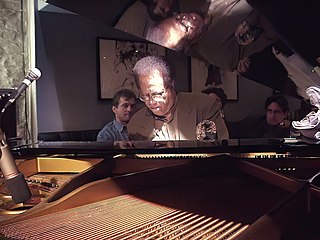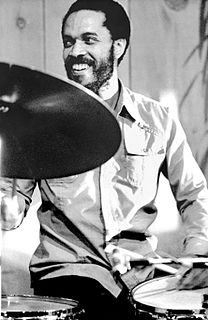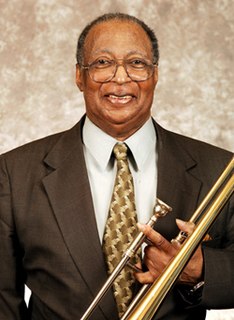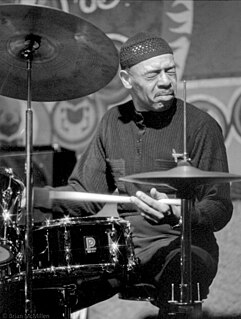
Cedar Anthony Walton, Jr. was an American hard bop jazz pianist. He came to prominence as a member of drummer Art Blakey's band, The Jazz Messengers, before establishing a long career as a bandleader and composer. Several of his compositions have become jazz standards, including "Mosaic", "Bolivia", "Holy Land", "Mode for Joe" and "Fantasy in D".

Billy Higgins was an American jazz drummer. He played mainly free jazz and hard bop.
William Franklin Hardman, Jr. was an American jazz trumpeter and flugelhornist who chiefly played hard bop. He was married to Roseline and they had a daughter Nadege.

Edward Hammond Boatner Jr., known professionally as Sonny Stitt, was an American jazz saxophonist of the bebop/hard bop idiom. Known for his warm tone, he was one of the best-documented saxophonists of his generation, recording more than 100 albums. He was nicknamed the "Lone Wolf" by jazz critic Dan Morgenstern because of his relentless touring and devotion to jazz. Stitt was sometimes viewed as a Charlie Parker mimic, especially earlier in his career, but gradually came to develop his own sound and style, particularly when performing on tenor saxophone.

Locksley Wellington "Slide" Hampton is an American jazz trombonist, composer and arranger. Described by critics as a master composer, arranger and uniquely gifted trombone player, Hampton's career is among the most distinguished in jazz. As his nickname implies, Hampton's main instrument is slide trombone, but he also occasionally plays tuba and flugelhorn.

Curtis DuBois Fuller was an American jazz trombonist. He was a member of Art Blakey's Jazz Messengers and contributed to many classic jazz recordings.

George Andrew Cables is an American jazz pianist and composer.

Robert Michael Watson Jr., known professionally as Bobby Watson, is an American saxophonist, composer, and educator.

Dennis Irwin was an American jazz double bassist. He toured and recorded with John Scofield and the Vanguard Jazz Orchestra among others, and played on over 500 albums.
Valery Ponomarev, Russian: Вале́рий Миха́йлович Пономарёв, Valery Mikhaylovich Ponomaryov, is a Russian-born jazz trumpeter. He has lived in the United States since 1973.

Samuel Jones was an American jazz double bassist, cellist, and composer.
Earl Theodore Dunbar was an American jazz guitarist, composer, and educator.

Albert Preston Dailey was an American jazz pianist.
Raymond Mantilla was an American percussionist.

Eddie Gladden was an American jazz drummer.

James Williams was an American jazz pianist.
Baystate was a Japanese jazz record label.

In My Prime Vol. 1 is an album by drummer Art Blakey and the Jazz Messengers recorded in 1977 and released on the Dutch Timeless label.

In My Prime Vol. 2 is an album by drummer Art Blakey and the Jazz Messengers recorded in 1977 and released on the Dutch Timeless label.

The Jazz Messengers were a jazz combo that existed for over thirty-five years beginning in the early 1950s as a collective, and ending when long-time leader and founding drummer Art Blakey died in 1990. Blakey led or co-led the group from the outset. "Art Blakey" and "Jazz Messengers" became synonymous over the years, though Blakey did lead non-Messenger recording sessions and played as a sideman for other groups throughout his career.
"Yes sir, I'm gonna to stay with the youngsters. When these get too old, I'm gonna get some younger ones. Keeps the mind active."















